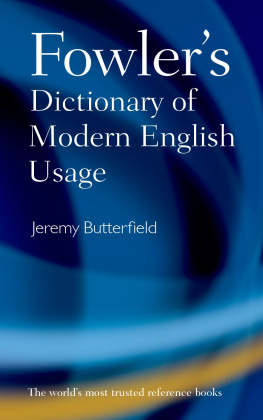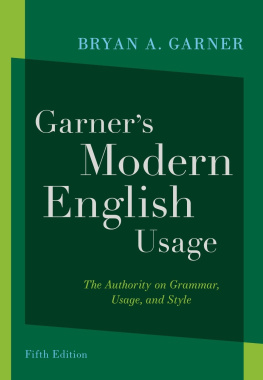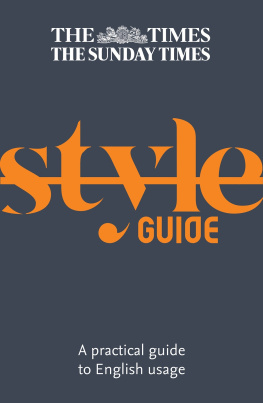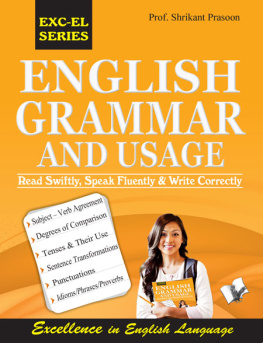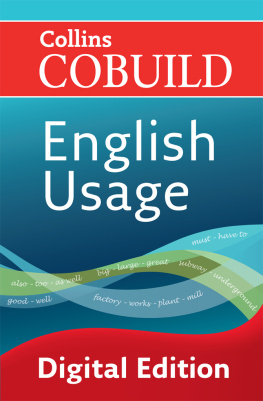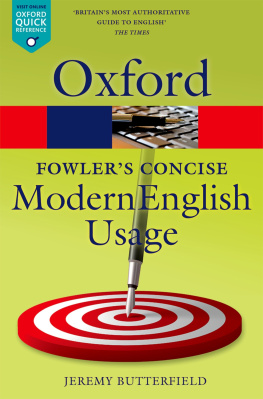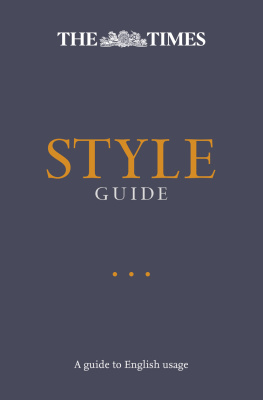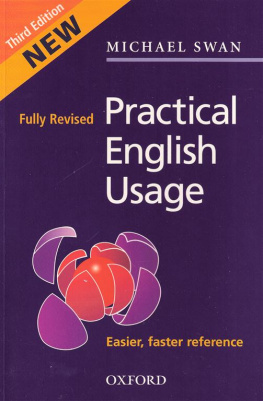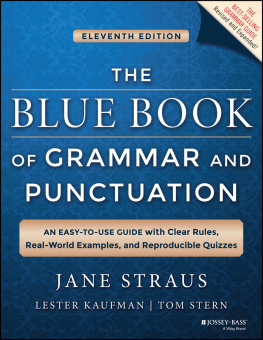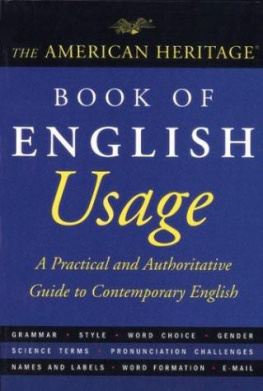How to search for terms in
Fowlers Dictionary of Modern English Usage
To find an entry in this e-book you can:
Browse the and select the entry you would like to view
or
Use your Search function to be taken to a complete list of references to your search term in the
CompanionIf your search term has its own entry, it will usually be listed at the top of your results
In cases where your search term appears in more than one entry heading, the results will be listed alphabetically
A note on special characters
While most e-readers can display special characters (such as and ), many cannot search for words containing them, unless the special characters themselves are typed into the search box. If you are unable to type these characters, please browse for your term using the .
Contents
Fowlers Dictionary of Modern English Usage

Great Clarendon Street, Oxford, OX2 6DP, United Kingdom
Oxford University Press is a department of the University of Oxford. It furthers the Universitys objective of excellence in research, scholarship, and education by publishing worldwide. Oxford is a registered trade mark of Oxford University Press in the UK and in certain other countries
Oxford University Press 1965, 1996, 2015
The moral rights of the authors have been asserted
First edition 1926
Second edition 1965
Third edition 1996
Fourth edition 2015
Impression: 5
All rights reserved. No part of this publication may be reproduced, stored in a retrieval system, or transmitted, in any form or by any means, without the prior permission in writing of Oxford University Press, or as expressly permitted by law, by licence or under terms agreed with the appropriate reprographics rights organization. Enquiries concerning reproduction outside the scope of the above should be sent to the Rights Department, Oxford University Press, at the address above
You must not circulate this work in any other form and you must impose this same condition on any acquirer
Published in the United States of America by Oxford University Press 198 Madison Avenue, New York, NY 10016, United States of America
British Library Cataloguing in Publication Data
Data available
Library of Congress Control Number: 2014945276
ISBN 9780199661350
ebook ISBN 9780191064944
Printed in India by Replika Press Ltd.
To my beloved parents, who gave me my first copy of Fowler when I was at the Royal Grammar School, Guildford.
Ours is a Copious Language, and Trying to Strangers.
mr podsnap in dickenss our mutual friend , 1865
Grammar is like walking. You have to think about it when you start but if you have to go on thinking about it you fall over. It should come as second nature.
alice thomas ellis in the spectator , 1989
Arguments over grammar and style are often as fierce as those over Windows versus Mac, and as fruitless as Coke versus Pepsi and boxers versus briefs.
professor jack lynch, the english language: a users guide , 2007
Time changes all things; there is no reason why language should escape this universal law. (Le temps change toute chose; il ny a aucune raison pour que la langue chappe cette loi universelle.)
ferdinand de saussure, course in general linguistics , 1959 ( 1916 )
First (for I detest your ridiculous and most pedantic neologism of firstly).
thomas de quincey , 1847
Comments on hopefully by members of a usage panel, as reported in 1985 :
I have fought this for some years, will fight it till I die. It is barbaric, illiterate, offensive, damnable, and inexcusable.
I dont like chalk squeaking on blackboards either.
Hopefully is useful or it would not be used so universally.
Grounded meaning a withdrawal of privileges is a word I dislike. Its off the television (Roseanne notably) but now in common use. (I just heard it on Emmerdale Farm, where they probably think its dialect.) I would almost prefer gated, deriving from Forties public school stories in Hotspur and Wizard. Other current dislikes: Brits; for starters; sorted; and (when used intransitively) hurting.
alan bennett in london review of books , 4 JAN. 1996
This new, fourth edition of Fowlers Dictionary of Modern English Usage has been thoroughly revised and updated to reflect how English speakers the world over use the language now, in the early twenty-first century. It offers detailed, reasoned guidance on thousands of points of grammar, spelling, punctuation, syntax, style, appropriate word choice, and pronunciation. It presents the facts of disputed or controversial usages and illuminates them with up-to-date examples, thereby enabling readers to make informed choices for themselves about their own usage.
In order to make the book relevant to modern users, my editing has consisted of three major tasks. To take editorial decisions, I have drawn on my observation and knowledge of contemporary usage issues derived from my experience as a teacher, translator, author, and former Editor-in-Chief of dictionaries.
First, the addition of over 250 new entries. These entries discuss words and phrases that have been coined or that have become more widespread since the previous edition. Many of them reflect the staggering changes in the way we communicate: blog, to google, hashtag, homepage, online, phablet, selfie, social media. Many, in contrast, are not new but raise usage or style issues not previously covered: achingly (pretentious? clichd?), ad nauseam (misspelt as -eum), to address (overused?), brainstorming (not, contrary to urban myth, politically incorrect), challenging (meaning exactly what?), epicentre (misused?), the problem is, is, to name just a few.
Some of the new entries also reflect changed attitudes towards (or around as many now say) language dealing with race, gender, disability, sexuality, and so forth: ageism, conjoined twins, the language of disability, Indigenous Australians.
Secondly, I examined each entry to see whether the points raised were still valid. In many cases, naturally, they were. That was particularly true of more straightforward matters such as spelling and alternative plural formsalthough even here some surprises emerged, such as changing conventions for plurals of Latin-derived words ending in -um, which can cause so much head-scratching.
But in less cut-and-dried areas, many of the conventions that applied at the time of the previous edition, nearly twenty years ago, have changed, and I have updated entries accordingly, e.g. between you and I, hopefully, or the much debated use of they, their, etc. after singular noun phrases and pronouns such as every student, everybody, everyone.
Thirdly, I have modernized, where appropriate, the style and tone of voice of entries. Sometimes this involved rephrasing dated or literary wording, or language that is lexicographerspeak; sometimes it meant removing a tone which was socially or linguistically outdated. Most visibly for the reader, because Fowler is a book that has always elucidated points of usage by well-chosen examples, I have carefully selected and added hundreds of examples of words being used in their modern contexts. To do this, I have drawn on a great variety of contemporary British, US, and international sources, ranging from the

